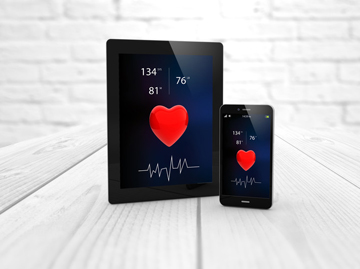 There are many strategies that physicians can adopt to enhance their efficiency and medical transcription outsourcing is one of them. Medical transcription services ensure accurate and timely electronic health record (EHR) documentation. Experts say that integrating mobile health apps or “mHealth” with the EHR system can help physicians make better use of their time and improve their productivity.
There are many strategies that physicians can adopt to enhance their efficiency and medical transcription outsourcing is one of them. Medical transcription services ensure accurate and timely electronic health record (EHR) documentation. Experts say that integrating mobile health apps or “mHealth” with the EHR system can help physicians make better use of their time and improve their productivity.
The use of mobile health applications and devices or “mHealth” is growing fast. Studies from Research2guidance.com found that almost 100,000 mHealth apps have been added since the beginning of 2016, amounting to 259,000 currently available on major app stores. Further, their report notes that in 2017, more than 3.4 billion people will have smartphones or tablets with access to mobile health apps.
According to a recent Medical Economics report, a growing number of physicians are interested in using mobile devices at their practices. Surveys show that technology can increase patient engagement, improve access to care, enhance safety, and make data collection easier. Technology may have its drawbacks, but the benefits outweigh the challenges, say advocates of mHealth. In fact, the results of a healthcare quality improvement survey by the American Society for Quality’s healthcare division released in 2016 revealed that 80 percent of healthcare professionals consider improved workflow efficiency as the answer to new technology implementations, and more than 70 percent see digital health tools as having the greatest impact. Today, there are mobile apps that improve care in many ways:
- Give physicians the ability to work on the go via tablets and/or smartphones.
- Allow physicians to connect with patients outside of the physical office
- Help physicians monitor patients with chronic conditions, patients scheduled for surgery, and those recovering from medical procedures
- Promote faster and easier interaction among physicians
- Allow patients to contact specialists via an online portal.
- Provides virtual consult follow-up in place of an in-office visit
- Allow patients to make payments
- Enable patients to communicate with providers in medical situations that may or may not require an ER visit
- Allow care teams share and enter short notes as well as use tags to set priorities
A mobile app allow physicians to monitor a diabetic patient’s blood sugar, insulin intake, diet, exercise, sleep patterns, and even moods. They can track patients with heart and breathing issues, and those undergoing treatment for diseases like cancer and Parkinson’s, mental illnesses and addictions. Today, physicians use mobile EHR apps to manage prescription refill requests and patient inquiries throughout the day, thereby minimizing the burden of administrative tasks that can pile up at end of the day.
Physicians can benefit by incorporated specific tasks into mobile. Many mobile versions of existing EHR applications allow physicians to include secure video visits via their mobile devices. Studies show video visits can be significantly shorter than in-person visits, allowing doctors to make the best use of their time.
There are secure messaging apps with access to patient records. With such apps, physicians can respond to patient inquiries between scheduled visits, which will cut down on the time they need at the end of the day to handle such requests
A mhealth intelligence report says that an engaged patient is ten times more likely to comply with a doctor’s care plan, including adhering to medication protocols and following a healthier lifestyle.
However, health IT experts caution that physicians need to consider various factors to ensure success with mobile EHR apps. To maximize results, they need to:
- consider how they will use mobile devices
- understand the constraints of the devices and EHR software
- deploy the mobile functions into their workflow practices
Accordingly, the American Medical Association (AMA) has adopted various policies designed to help integrate the escalating field of mHealth into clinical practice. This is important as not all mobile apps for healthcare are FDA approved. Mhealth has to be subject to stringent evaluation before deployment to ensure quality care and patient safety. A 2016 AMA Wire report says that the AMA has stated that insurance coverage and reimbursement policies for mHealth apps, devices, trackers and sensors for use by patients, physicians and other health professionals should be guided by certain principles. According to these principles, state such technologies should:

- Maintain the establishment or continuation of a valid patient-physician relationship
- Have a high-quality clinical evidence base to support their use in order to ensure mHealth app safety and effectiveness
- Follow evidence-based practice guidelines, especially those developed and produced by national medical specialty societies and based on systematic reviews, to ensure patient safety, quality of care and positive health outcomes
- Support patient-centered care delivery, promote care coordination and facilitate team-based communication
- Promote data portability and interoperability in order to support care coordination via medical home and accountable care models
- Comply with state licensure laws and state medical practice laws and requirements in the state in which the patient receives services facilitated by the app
- Call for physicians and other health professionals providing services through the app to be licensed in the state where the patient receives services or be providing these services as otherwise authorized by that state’s medical board
- Ensure that the delivery of any app-provided services are consistent with state’s practice laws
With the judicious use of mHealth EHR apps, physicians can be more accessible while minimizing their time pressures, than if they were tied to their desktop computer. EHR-integrated medical transcription services are a viable option as mHealth gains traction. Experienced medical transcription companies can ensure quality EHR data which is crucial for physicians to make quick therapeutic decisions in this fast-paced, mobile environment.


